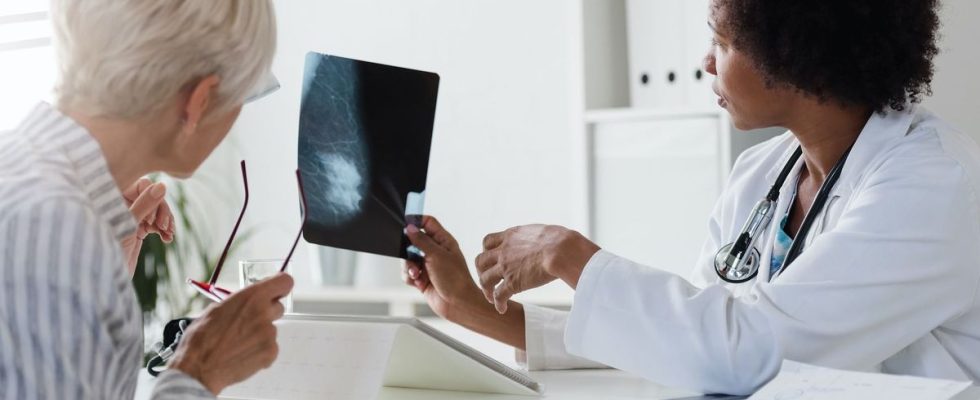Published on
Updated
Reading 4 mins.
According to a new study, overdiagnosis of breast cancer is quite common in women over 70. For them, the treatment undertaken could be more harmful and stressful than the tumor itself. Should we persist in screening and treating at all ages? Dr Anne Sabaila Ollier, surgical oncologist at the Breast Institute answers us.
Should cancer be fought at all costs at an advanced age? This is the question raised by a new report published by Annals of Internal Medicine about breast cancer. He concludes that overdiagnosis is too frequent in patients aged 70 and over.
What is overdiagnosis in breast cancer?
We speak of overdiagnosis when a detected cancer exists, but will not necessarily cause a problem during the remaining life of the patient. Given the age of diagnosis, the progression of the cancer would probably not have caused any symptoms for the rest of the patient’s life. And if this person had never been screened, they would never have realized that they had cancer.
According to Cancer Research UK, overdiagnosis is a problem, as it leaves people unnecessarily enduring arduous treatments and the psychological and emotional distress that goes with it. This choice to treat or not concerns many women today.
47% of screeners aged 74 to 84 would be “overdiagnosed”
According to this report, among a population of more than 50,000 women, continued breast cancer screening after age 70 was linked to a greater incidence of cancers that would not have caused symptoms in later life. life of the person/patient.
All participants had been screened for breast cancer in the recent past. After analyzing the data, the researchers found that the risk of overdiagnosis logically increased as women aged.
- In women aged 70 to 74, they estimated that 31% of breast cancers were overdiagnosed;
- Between the ages of 74 and 84, this figure rose to 47%;
- Among people aged 85 and over, it increased further to 54%.
However, the researchers said they did not find a significant reduction in breast cancer deaths as a result of these screenings. Currently, screening guidelines for women in this age group vary from country to country because the benefit/risk balance is not always easy to assess – in other words, it is not known whether at this age, the disadvantages of screening outweigh the advantages.
Mammography or not, after 74 years?
Logically the question arises: is it relevant to screen women beyond a certain age? Dr Anne Sabaila Ollier, senologist at the Institut du Sein, first wishes to underline the importance of free screening in France for all women aged 50 to 74:
“It is important to remember that, overall, screening, which consists of a mammogram and possibly other examinations (ultrasound and MRI) is an important tool that has demonstrated a decrease in breast cancer mortality from 15 to 30 %. The impact is strong on the entire female population! This screening also makes it possible to detect cancer at an early stage, which means lighter treatment for the patient. It’s not about questioning it.”
The overdiagnosis analyzed in the study, if it is real, is more difficult to address in practice:
“What is complicated is that this overdiagnosis is a statistical tool at the level of a population. Thus, we can say in view of the results and according to the characteristics of a population that in so many cases, we have treated too much. But it’s something you can’t do on an individual scale, seeing a patient. You can’t say how her cancer will evolve and what impact it will have on her life expectancy.” .
However, overdiagnosis is a risk known to professionals in France, and the reason why organized screening stops at the age of 74. Beyond that, screening is no longer scheduled “but that does not prevent individual screening! Women are still followed by their doctor or their gynecologist, who regularly performs a palpation to detect a lesion, a change in the breast. says our expert.
Mammography or not? This must be the subject of a discussion between the doctor and his patient: “An 80-year-old woman who feels fit, may also want to have this opportunity to detect something in time with a lighter treatment” reminds the doctor. And in this case no reason to refuse him.
The treatment, a choice that must be made on a case-by-case basis
The real question for the senologist is whether or not the patient’s quality of life can be improved.
“There is not one cancer, but breast cancers which will have different prognoses, and different evolutions. The treatment, or not, must be adapted according to the patient, her age, her life expectancy, her general condition, and her wishes, as well as possible side effects. The real challenge is to improve decision-making tools for doctors and patients. There is no point in doing a mammogram and undertaking treatment on an 85-year-old woman who is in poor general condition. But any decision must be considered between doctor and patient and a multidisciplinary team.
For all cancer patients, a multidisciplinary consultation meeting (RCP) allows doctors to validate the treatment plan that will be proposed to the patient. It constitutes a guarantee of the quality of subsequent care.
